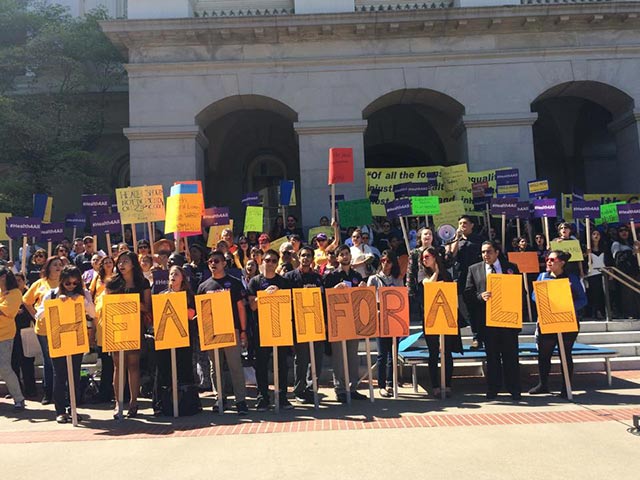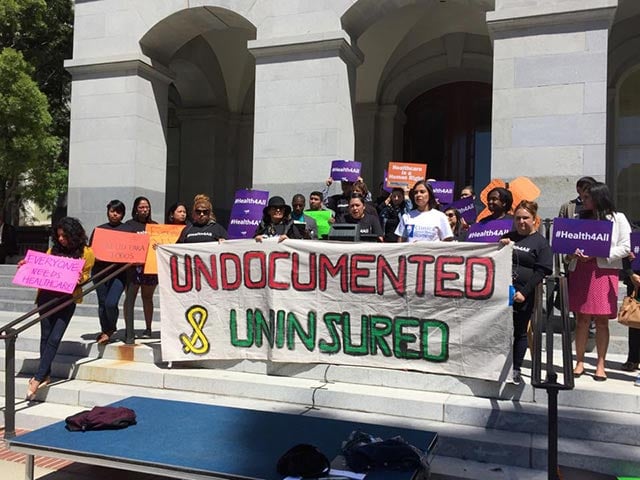
Support justice-driven, accurate and transparent news — make a quick donation to Truthout today!
It has been five years since the Affordable Care Act (ACA) was passed. After the official launch of the ACA, millions of previously uninsured people were able to gain health insurance for the first time. There are positive reports cheering the ACA’s success. According to Gallup’s most recent report, the percentage of uninsured Americans dropped to 11.9 percent, the lowest since the ACA was launched.
Despite the positive reports, millions of people still can’t obtain adequate health-care services and many have become bankrupt to save their loved ones. For 11 million undocumented immigrants, the situation is even more severe. The Obama administration explicitly barred undocumented immigrants from access to its most significant legislative accomplishment. This means millions of undocumented immigrants are barred from purchasing subsidized health insurance under the ACA.
As a result, millions of undocumented immigrants endure their illnesses to avoid expensive hospital bills they can’t afford. Because many undocumented immigrants choose to endure pain instead of seeking necessary treatment in the initial stage of their illnesses, their conditions become worse, and they must seek costly medical services. According to a report from the Commonwealth Fund, “Nationally, an estimated three-fifths (61.5%) of nonelderly adults who are undocumented immigrants are expected to remain uninsured. As a result, undocumented residents will make up a larger share of the remaining uninsured population in the country.”
Furthermore, the federal government’s failure to improve the country’s immigration system exacerbates the situation for undocumented immigrants. According to a UCLA Labor Center study,
President Obama’s administration has deported nearly two million people within the past five years; creating a climate of constant hypervigilance and fear of authorities that compromises immigrants’ level of comfort and trust with the US health care system. This kind of social and systemic trauma takes a toll on the minds and bodies of the undocumented and their loved ones, increasing their risk for poor health. The health of immigrant communities cannot be separated from the need for immigration reform and an end to deportations.
In order to address the lack of health care for undocumented immigrants, immigrant rights groups have been working hard to expand health-care access at the state level. In California, SB 4 or Health for All legislation was introduced to expand the state-level health-care program, Covered California, and Medi-Cal to cover uninsured residents, regardless of immigration status.
On April 13, immigrant rights organizations in California gathered in Sacramento to visit their legislators as part of this effort. At this gathering, thousands of immigrant rights organizers and advocates were able to meet with their representatives to address the urgent need for health-care services for undocumented immigrants.
 (Photo: Sandy Valenciano/The California Immigrant Youth Justice Alliance)
(Photo: Sandy Valenciano/The California Immigrant Youth Justice Alliance)
Akiko Aspillaga is a community organizer at ASPIRE, the first pan-Asian undocumented youth group in the country. With ASPIRE, Aspillaga has become one of the most active participants in the fight to expand health-care access for the undocumented community. During her visit to Sacramento, she shared a powerful testimony on why she joined this effort:
My mother is a Certified Nurse Assistant who cares for the older population. I am a Registered Nurse. Both of us are in the healthcare field, but ironically, we are not able to care for ourselves due to the lack of resources available to us. Give families like mine a chance to access healthcare without fear. The inclusion of undocumented people in Medi-Cal and Covered California is the first step to ensure that all Californians have access to healthcare.
If the goal of the ACA is to provide affordable health care, the ACA must be expanded to cover everyone, regardless of immigration status. The state-level approach to expand health-care access is not enough to address the national issue. Moreover, more studies are revealing that the current ACA is insufficient to solve the ongoing health-care crisis in the country.
- The Commonwealth Fund ranked the US health-care system the worst among the 11 world’s most developed countries based on the criteria of “efficiency, equity and outcomes.”
- The Organization for Economic Cooperation and Development (OECD) report revealed that the US spends the most for their health-care system: 16.9 percent of GDP, almost twice of the OECD average of 9.3 percent.
- The resources for health care are geared toward the wealthy. Half of all health-care spending ($623 billion) is going toward the top 5 percent.
- The Physicians for a National Health Program’s report estimates about 30 million people will still not have access to health care by 2023.
- People in the US have to pay much more for the very same health services and drugs other countries use because the government does not negotiate drug prices for their people.
- The US is the only developed country in the world that does not mandate a minimum of paid sick leave.
In order to solve the ongoing health-care crisis, the issue itself must be addressed from a holistic perspective to provide much needed health care for everyone. Ultimately, the current health-care system must be replaced with a single-payer system focusing on actual people who need health care. After all, the ACA is only a Band-Aid to cover the terminal illness this country has been suffering for decades.
Trump is silencing political dissent. We appeal for your support.
Progressive nonprofits are the latest target caught in Trump’s crosshairs. With the aim of eliminating political opposition, Trump and his sycophants are working to curb government funding, constrain private foundations, and even cut tax-exempt status from organizations he dislikes.
We’re concerned, because Truthout is not immune to such bad-faith attacks.
We can only resist Trump’s attacks by cultivating a strong base of support. The right-wing mediasphere is funded comfortably by billionaire owners and venture capitalist philanthropists. At Truthout, we have you.
Truthout has launched a fundraiser to raise $34,000 in the next 5 days. Please take a meaningful action in the fight against authoritarianism: make a one-time or monthly donation to Truthout. If you have the means, please dig deep.